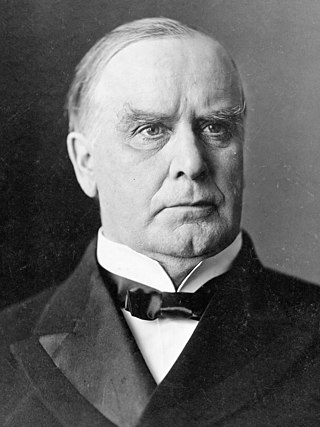
Presidential elections were held in the United States on November 6, 1900. Incumbent Republican President William McKinley defeated his Democratic challenger, William Jennings Bryan. McKinley's victory made him the eighth president to win consecutive re-election and first since Ulysses S. Grant accomplished the same feat in 1872. Until 1956, this would be the last time in which an incumbent Republican president would win re-election after serving a full term in office. This election saw the fifth rematch in presidential history but the first to produce the same winner both times; neither would occur again until 1956.

Presidential elections were held in the United States on November 6, 1984. Incumbent Republican President Ronald Reagan and his running mate, incumbent Vice President George H. W. Bush, were reelected to a second term in a landslide. They defeated the Democratic ticket of former Vice President Walter Mondale and Congresswoman Geraldine Ferraro.
The Liberal and Centre Union was a conservative-liberal political party in Lithuania active between 2003 and 2014.

The Social Democratic Party is a social-democratic political party on the Faroe Islands, led by Aksel V. Johannesen.

The Freedom Party, formerly known as the Socialist Movement for Integration, is a social democratic political party in Albania. The party was formed on 6 September 2004, when Ilir Meta defected from the Socialist Party of Albania (PS). A proposal to change its logo, name and other symbols was unanimously approved at the party's National Convention (Congress) on 25 July 2022. The party is seen as more socially conservative than the Socialist Party of Albania.

The Democratic Party is a social democratic political party in Italy. The party's secretary is Elly Schlein, elected in the 2023 leadership election, while the party's president is Stefano Bonaccini.
The Arab National Party is a minor Israeli Arab political party in Israel led by Muhamad Kanan.

Elections in Ohio are held on a county, state, and federal level. The Republicans are strongest in the rural Northwest, the affluent Cincinnati and Columbus suburbs, and have made gains in Appalachian Southeast Ohio and the industrial, working-class Northeast in the 21st century. The Democrats rely on the state's major cities, and have made gains in educated suburban areas in recent years.

The 2014 European Parliament election in Malta elected Malta's delegation to the European Parliament from 2014 to 2019. This was the third such election held in Malta. The elections were held on Saturday, 24 May 2014.

An election was held in Portugal on Sunday, 25 May 2014, to elect the Portuguese delegation to the European Parliament from 2014 to 2019. This was the seventh European Parliament election held in Portugal.
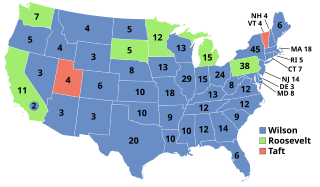
The 1912 United States elections elected the members of the 63rd United States Congress, occurring during the Fourth Party System. Amidst a division between incumbent Republican president William Howard Taft and former Republican president Theodore Roosevelt, the Democratic Party won the presidency and both chambers of Congress, the first time they accomplished that feat since the 1892 elections.
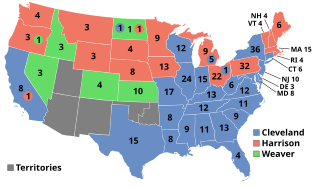
The 1892 United States elections was held on November 8, electing member to the 53rd United States Congress, taking place during the Third Party System. Democrats retained the House and won control of the presidency and the Senate. Following the election, Democrats controlled the presidency and a majority in both chambers of Congress for the first time since the 1858 elections.
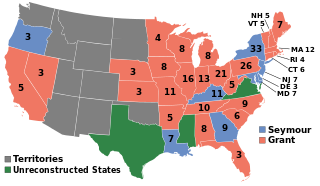
The 1868 United States elections was held on November 3, electing the members of the 41st United States Congress. The election took place during the Reconstruction Era, and many Southerners were barred from voting. However, Congress's various Reconstruction Acts required southern states to allow Black men to vote, and their voting power was significant to the elections results.
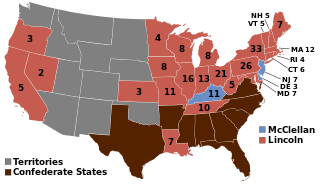
The 1864 United States elections were held on November 8, 1864. National Union President Abraham Lincoln was elected to a second term, while the Republicans added to their majorities in Congress. The elections were held during the American Civil War. Lincoln would be assassinated shortly into his second term.

The 1852 United States elections elected the members of the 33rd United States Congress. The election marked the end of the Second Party System, as the Whig Party ceased to function as a national party following this election. Democrats won the presidency and retained control of both houses of Congress.

The 1840 United States elections elected the members of the 27th United States Congress, taking place during the Second Party System. In the aftermath of the Panic of 1837, the Whigs become the fourth party in history to win control of the presidency and both houses of Congress; the Whigs would never again accomplish this feat. The election also marked the first time since the 1834 elections that the Democratic Party did not control the presidency and both chambers of Congress.
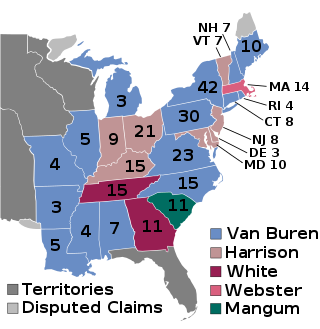
The 1836 United States elections elected the members of the 25th United States Congress. The election saw the emergence of the Whig Party, which succeeded the National Republican Party in the Second Party System as the primary opposition to the Democratic Party. The Whigs chose their name in symbolic defiance to the leader of the Democratic Party, "King" Andrew Jackson, and supported a national bank and the American System. Despite the emergence of the Whigs as a durable political party, Democrats retained the presidency and a majority in both houses of Congress.

The 1824 United States elections elected the members of the 19th United States Congress. It marked the end of the Era of Good Feelings and the First Party System. The divided outcome in the 1824 presidential contest reflected the renewed partisanship and emerging regional interests that defined a fundamentally changed political landscape. The bitterness that followed the election ensured political divisions would be long-lasting and facilitated the gradual emergence of what would eventually become the Second Party System. Members of the Democratic-Republican Party continued to maintain a dominant role in federal politics, but the party became factionalized between supporters of Andrew Jackson and supporters of John Quincy Adams. The Federalist Party ceased to function as a national party, having fallen into irrelevance following a relatively strong performance in 1812.

The 1820 United States elections elected the members of the 17th United States Congress. The election took place during Era of Good Feelings and the First Party System. Despite the Panic of 1819, the Democratic-Republican Party maintained control of the presidency and both houses of Congress, while the Federalist Party provided only limited opposition. Missouri joined the union during the 17th Congress.

The 1800 United States elections elected the members of the 7th United States Congress. The election took place during the First Party System, and is generally considered the first realigning election in American history. It was the first peaceful transfer of power between parties in American history. The Democratic-Republican Party won control of the presidency and both houses of Congress for the first time. Conversely, the Federalist Party would never again control the presidency or either house of Congress. Ohio was admitted as a state during the 7th Congress.

















